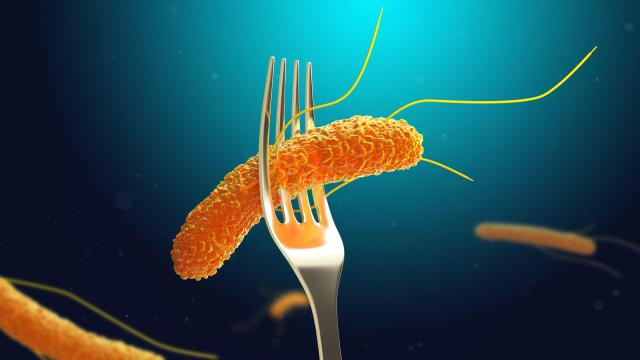Climate change will make stomach bugs an even bigger problem, a new report has found. The study concludes that expected changes in temperature, precipitation, and humidity will make foodborne infections and toxins all the more common—at least in Germany. That said, other research has indicated that these increased risks will be seen globally as well.
The research is part of a special series by scientists in Germany looking at the regional health impacts on climate change. It was published in June in the Journal of Health Monitoring. It’s a review of the literature and focuses on common foodborne illnesses caused by Salmonella, Campylobacter, and Vibrio bacteria, the parasites Cryptosporidium and Giardia, and other toxins produced by marine life.
Across the board, the researchers found evidence that all these infections and toxin poisonings will steadily increase in the years to come due to climate change, though for many varying reasons.
Outbreaks of germs like Salmonella and Campylobacter tend to appear more frequently in the summer months, for instance, so warmer seasons that last longer should increase their incidence. Cryptosporidium and Giardia parasites might be able to contaminate water systems or vegetation more often as a result of extreme flooding events fueled by climate change. Climate change’s complex influence on the world’s oceans can also help drive the formation of dangerous algae blooms, whose toxins can then enter the food chain. And even less obvious effects, like warmer temperatures making people more likely to barbeque (and undercook) their chicken, could lead to more foodborne disease.
“The expected increase in foodborne infections and intoxications presents a growing public health risk in Germany,” the authors wrote.
While this report only concerns Germany, there’s no reason to believe that the factors identified here won’t make foodborne outbreaks worse in many parts of the world. Last November, for example, the European Environment Agency published its own report concluding that climate change would increase the risk of foodborne infections throughout Europe, including in regions previously untouched by certain specific germs. In the U.S., the National Institute of Environmental Health Sciences has similarly warned that climate change will negatively affect food safety globally.
Important as these warnings are, the authors of the current report say that it’s well past time to start taking action to mitigate these risks, both on a small and large scale.
“Our main recommendations for minimizing the health risk from foodborne infections and intoxications lie in the area of kitchen hygiene, which should always be applied when preparing food,” the scientists wrote. “This includes thorough handwashing and the use of fresh kitchen utensils after handling raw meat and fish, as well as avoidance of cross-contamination,” the authors wrote.
To which they added: “We also recommend the use of new technologies to track supply chains. Given a globalised food distribution network and the use of different processing and preservation techniques, it can be difficult to track a product’s supply chain to identify potential risks.”
